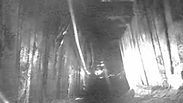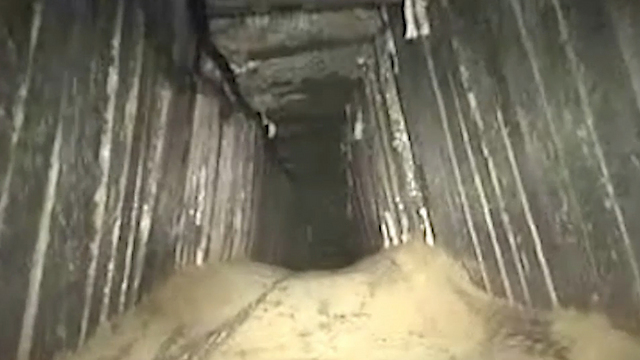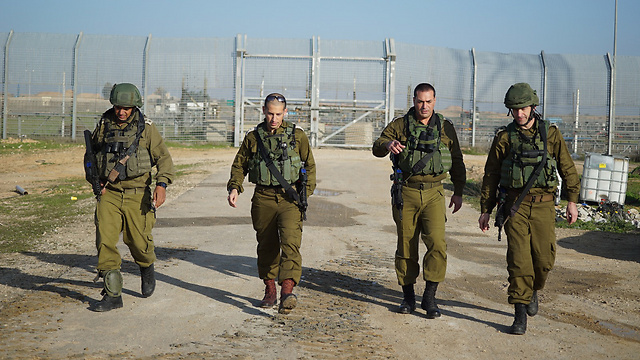
Tunnel uncovered under the Kerem Shalom Crossing
צילום: דובר צה"ל
Israel’s calculated tunnel demolitions
Analysis: The IDF is likely capable of uncovering and demolishing a number of cross-border tunnels simultaneously; so far, however, it has chosen to destroy each tunnel separately, giving the other side an opportunity to digest what happened rather than pushing it towards desperate measures.
The amount of noise created when hundreds of kilograms of explosives are dropped from the air is frightful, which is why the army decided to issue an early warning to Gaza vicinity residents on Saturday night. In fact, it was the first time Israel admitted that the Air Force plays a significant role in the demolition of tunnels.
This time, the IAF attacked a tunnel shaft near Rafah, several hundred meters from the Israel border.
The IAF wasn’t alone in this attack. The tunnel was destroyed from the ground as well. Only last week, Chief of Staff Gadi Eisenkot visited the Gaza vicinity to observe an exercise conducted by one of the IDF’s special units, which included taking over and destroying an attack tunnel. The techniques developed in the past year have already been implemented in the demolition of four tunnels in the past two months, and they just keep improving.
The technological aspect of locating and destroying tunnels coming out of the Gaza Strip has a much more complicated and complex political side. Dealing with the tunnels is like crawling in a minefield. You uncover one mine after another, you move forward, but you have no idea if you’ll make it to the other side of the field in one piece—in other words, destroying all the tunnels by the end of the year without leading to a war.
At the moment, an all-out war in Gaza is against Israel’s interest. It may disrupt the completion of the underground obstacle and the new border fence around Gaza, lead to a deterioration in the Palestinian arena in general and create difficulties vis-à-vis the Egyptians. Most importantly, there is no one else who can be given control of the strip.
Israel’s only clear policy is to try to dry Hamas up, provide Gaza with minimum means of living, allow the strip to keep its head just above the water, hoping that one day we’ll reach a formula of demilitarizing the strip in return for reconstruction.
Israeli officials simply don’t want to stop playing by the rules. Based on the means at its disposal, Israel is likely capable of knowing whether there are other tunnels. Past experience shows that as soon as the army detects the route of an infiltrating tunnel, it doesn’t need too much time to prepare for its destruction. We can also assume that Israel is capable of demolishing a number of tunnels simultaneously. So far, however, it has chosen to destroy each tunnel separately, in time intervals, to give the other side an opportunity to digest what happened.
The policy set by the defense establishment is, on the one hand, to push Hamas into a corner and make it clear that it is losing its tunnel weapon, and on the other hand, not to make the organization resort to desperate measures. As a result, the IDF’s response to the occasional rockets fired from Gaza is perceived as too weak. Defense Minister Avigdor Lieberman has been playing a key role in restraining the harsh criticism of his colleagues in the government, who see every failure to respond to a rocket with lethal fire as defeatism.
The real test, defense establishment officials say, isn’t the rocket test but the ability to keep destroying tunnels without leading to an unnecessary escalation, which is why not every tunnel is destroyed immediately after being uncovered. It’s reasonable to assume that the target isn’t destroyed before professionals examine the enemy’s state of mind.
As a timing error could have regional political consequences, Israel is likely trying to moderate its response by creating a narrative that would make it difficult for the other side to respond.
In the latest incident, for example, Israel went to trouble of reporting that the tunnel—which was defined as a Hamas operational tunnel—had reached all the way into Egypt. In other words, the tunnel had been used to transfer weapons and fighters to and from Gaza under the Egyptian patron’s nose. Images released by the army indicate that it was an unusually large tunnel with room for vehicles too.
Now, the army is likely examining the responses to the fourth tunnel and preparing for the fifth tunnel.












